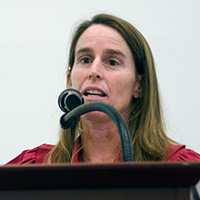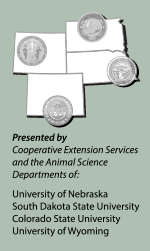Low-stress Stockmanship
Benefits in the Feedyard
Cattlemen can control stockmanship, affects cattle performance.
LOVELAND, Colo. (Nov. 18, 2015) — “Quite simply, stockmanship is a requirement for a sustainable future,” said Anne Burkholder, owner of Will Feed Inc., Cozad, Neb. Her No. 1 job is as an animal caregiver, and putting less stress on calves lets the calf convert finite resources into more gain in the feedyard.

Anne Burkholder, owner of Will Feed Inc., Cozad, Neb.
Coming from a non-ag background, she shared with attendees of the Range Beef Cow Symposium in Loveland, Colo., that her business plan is a reflection of herself, and it is different than that of her father-in-law, who preceded her in feedyard ownership. Her feedyard has vertical collaboration to reduce stress and improve product quality and efficiency. She traces vaccination and health history on incoming cattle, which she buys through private treaty to build relationships and ease transportation stress. She uses professional veterinary and nutritional consultants.
She also uses careful bunk-reading techniques and delivers feed in a timely fashion. They make sure all home pens are clean and comfortable. This business plan may not make the operation more money, but everyone is happier at the end of the day, she noted. Some of her employees were skeptical on low-stress stockmanship, but now all are firm believers.
She acclimates all cattle and all of her staff members (and daughters) use low-stress animal-handling techniques. She strongly supports acclimation for new cattle to the feedyard, saying it teaches the cattle to recognize the home pen is where they want to be. It teaches cattle to walk in straight lines, to exit the home pen and to travel with confidence down the alleyway and into the corral. Cattle gravitate toward the feedbunk and water when they are acclimated, thus going on feed more quickly and smoothly.
Additionally, it enables safer, more effective handler-animal interactions. More comfortable cattle equal more efficient feed conversion and higher-quality beef, she asserted. Acclimated cattle are quieter and easier to handle, thus making the daily workload more enjoyable.
She shared five lessons she’s learned from her cattle.
- 1. Proper preconditioning is vital to animal performance.
- 2. A calf must be bred with an innate desire to live and be phenotypically capable of staying healthy all the way to the packing plant.
- 3. Limiting stress is critical for both calf health and performance. To effectively limit stress, cattle caregivers must work together to continuously meet the needs of the calf.
- 4. Cattle’s past experiences help determine the future.
- 5. It is the little things that count. Paying attention to detail when caring for a prey animal is a critical component for success. Learn to “think like a calf” to set it up for success, because the calf can’t think like you.
Stockmanship really shows its benefit at the packing plant, she added.
Low-stress stockmanship is something that cattlemen can control, she concluded, and it affects morbidity, mortality, feed conversion, carcass quality, food safety and worker safety.
Editor’s Note: This summary was written under contract or by staff of the Angus Journal®, which retains the copyright. To request to reprint this article, contact Shauna Rose Hermel, editor, at 816-383-5270. PowerPoints are posted with permission of the presenter and may not be reproduced in whole or in part without the express permission of the presenter. Angus Journal claims copyright to this web site as presented. We welcome educational venues and cattlemen to link to this site as a service to their audience.
The Angus Journal's coverage of the event is made possible through collaboration with the event committee and sponsorship of LiveAuctions.tv. For questions about this site, or to notify us of broken links, click here. Look for additional coverage in the Angus Journal, the Angus Beef Bulletin, the Angus Journal Daily, the Angus Beef Bulletin EXTRA and Angus TV.


